PLEASE NOTE:
While the following article relates to your Google search, the services and methods at Goodwin Hypnosis may differ from those mentioned below. Since 2007, we have helped thousands of clients to overcome emotional and behavioral challenges when all else had failed. According to many of them (and their referring healthcare providers), our methods are faster than talk therapy, easier than willpower, and safer than medication. If you’re ready to resolve your issues, skip the article and visit the rest of our website, where you can learn about our unique approach, watch client testimonial videos, and discover how working with us one-on-one could be the solution you’ve been searching for.
Introduction
In a world where stress and anxiety often feel like unwelcome companions, understanding their impact on the body can be a crucial first step toward healing. Anxiety, while a natural response to life’s pressures, can manifest in ways that profoundly affect physical health—most notably through an increased heart rate. For many, this physiological response can lead to feelings of panic and distress.
Yet, there is hope in exploring effective strategies to calm both the mind and body. From deep breathing exercises to the power of nutrition and sleep, individuals can find solace in a variety of techniques designed to foster emotional well-being. This article delves into the intricate relationship between anxiety and heart rate, offering practical tools and insights that empower readers to navigate their anxiety with grace and resilience.
Through shared experiences and expert advice, a path toward a more balanced and peaceful life unfolds, inviting everyone to embrace the journey of healing.
Understanding Anxiety and Its Impact on Heart Rate
Anxiety, although a natural reaction to stress, can significantly impact our bodies, especially shown as an elevated pulse. Research indicates that approximately 70% of individuals with anxiety disorders experience elevated heart rates during episodes of worry. When we encounter stress, our body instinctively enters a 'fight or flight' mode, triggering the release of stress hormones like adrenaline. This physiological response prepares us to confront perceived threats, but it can also lead to overwhelming feelings of panic and distress.
Sharon, a client who faced difficulties with stress and overwhelm, shared,
'I tried talk therapy for quite a bit of time and realized that I was going in circles, just talking about my problems and not fixing them.'
She found transformative support through hypnotherapy and noted,
'Since then, my situation has improved in so many ways, from setting up boundaries in my personal life and at work to being able to change my mindset.'
Brad's journey also highlights the potential for healing; after thirty years of distress rooted in childhood memories, he discovered how hypnosis sessions could liberate his mind from the past. He described his experience as life-changing, emphasizing how he learned to navigate his feelings without the weight of fear.
Comprehending the complex relationship between stress and pulse is essential for individuals aiming to manage their symptoms with poise. A case study from the Global Steering Group for Impact Investment highlights how stress affects physiological health, emphasizing the need for effective coping strategies. Techniques such as guided visualization and relaxation exercises used in hypnotherapy can significantly reduce heart rate and promote a sense of calm.
It's important to remember that experiencing anxiety is a shared human experience, helping to reduce the stigma that often surrounds it. As another client noted,
'I feel less anxious, sleep better, and have all the tools I need to make better choices.'
By acknowledging these feelings, individuals can feel empowered to explore effective coping strategies that promote emotional well-being and physiological calmness.
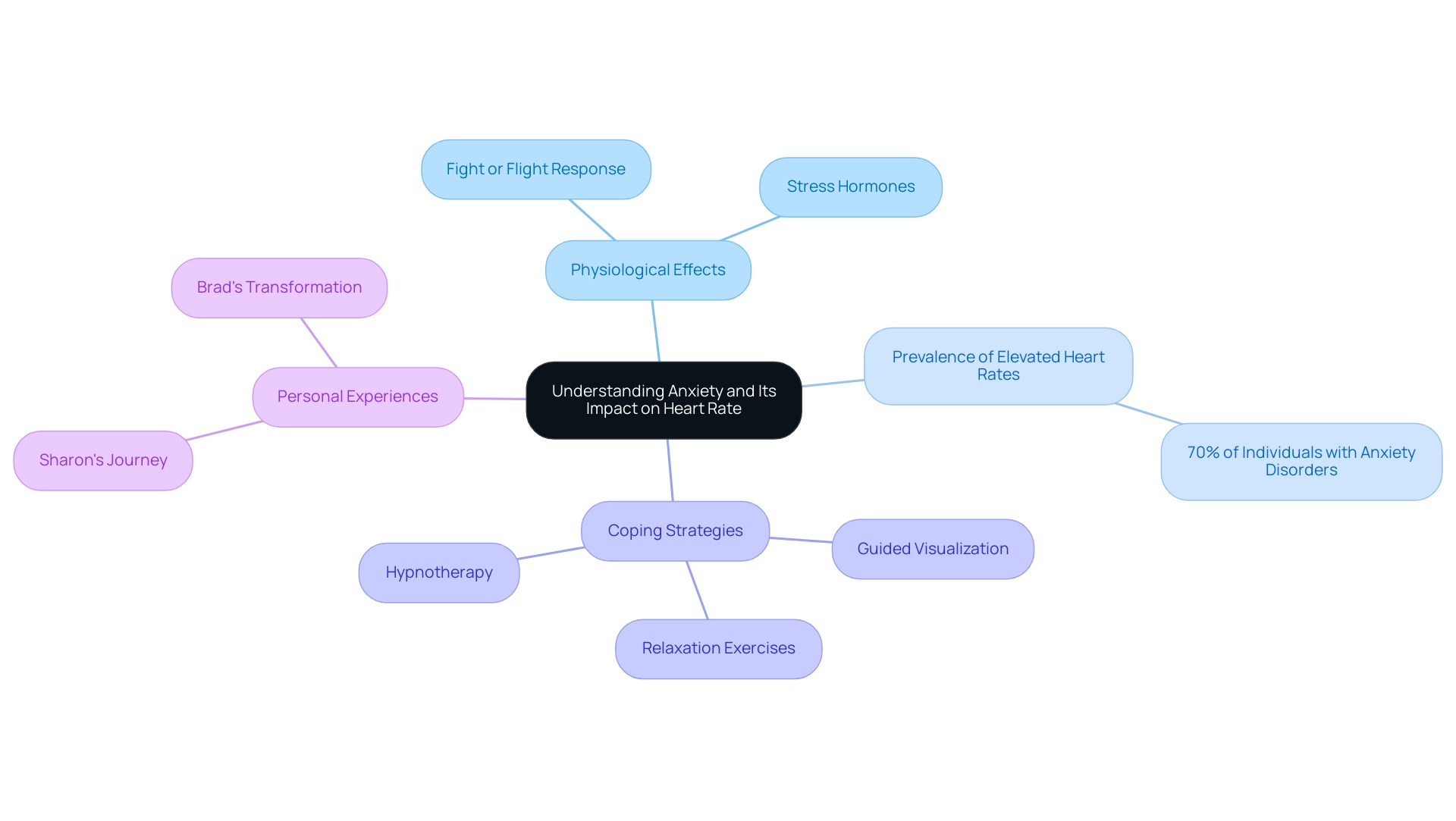
Practical Techniques to Calm Your Heart Rate
-
Deep Breathing Exercises: One of the most accessible and effective methods to soothe your pulse is through deep breathing. By inhaling slowly through your nose for a count of four, holding for four, and exhaling gently through your mouth for a count of six, you create a rhythm that signals your body to relax. Engaging in this cycle several times can help anchor you to the present moment and foster a sense of calm. According to specialists, deep breathing can greatly decrease pulse and lessen sensations of unease, making it an essential method for stress control. As numerous clients at Goodwin Hypnosis have found, mastering breathing techniques can lead to significant changes in emotional balance and stress management, as shown by testimonials emphasizing their effectiveness alongside hypnosis.
-
Mindfulness Meditation: Mindfulness meditation offers a sanctuary of peace amidst chaos. By focusing on your breath and observing your thoughts without judgment, you can cultivate an atmosphere of acceptance. A study published in the journal Psychological Science found that mindfulness meditation can decrease stress by up to 30%, making it a powerful instrument for regulating pulse. Allow yourself to release any racing thoughts, embracing the stillness that arises. This practice resonates with many of Todd and Gina Goodwin’s clients, who report lasting relief from stress through mindful awareness, often enhanced by the insights gained during their hypnosis sessions.
-
Progressive Muscle Relaxation: This technique invites you to reconnect with your body. By tensing and then relaxing each muscle group, starting from your toes and moving up to your head, you can effectively release physical tension. This practice not only lowers your heart rate but also promotes a profound sense of psychological recovery. Research on PMR in dancers showed a marked improvement in sleep quality and decreased stress, demonstrating the effectiveness of this technique in real-world applications. Many clients at Goodwin Hypnosis have found this method particularly useful in overcoming emotional trauma and stress, contributing to their overall mental health recovery, especially when combined with hypnosis.
-
Physical Activity: Participating in light physical activities, such as walking or gentle stretching, can be remarkably beneficial for managing stress. Only ten minutes of activity can activate the body's relaxation response, assisting in reducing your pulse naturally. This simple act of nurturing your body can create a ripple effect of well-being, encouraging both mental and physical health. Goodwin Hypnosis encourages clients to incorporate movement into their healing journeys as a way to foster resilience against anxiety, often noting how this complements their hypnosis sessions.
-
Visualization Techniques: Immerse yourself in a calming scene—perhaps a tranquil beach or a serene forest. Utilizing all your senses in this visualization allows you to step away from anxious thoughts and slow your heart rate. This technique is not merely an escape but a powerful practice that can ground you and promote balance in feelings. Many clients at Goodwin Hypnosis report that visualization, alongside hypnosis, can facilitate deep emotional healing and a sense of control over their stress, reinforcing the benefits of these combined approaches.
-
Listening to Soothing Music: Music has a remarkable ability to influence our emotions. Curating a playlist filled with calming melodies can serve as a comforting companion during moments of unease. Studies show that listening to calming music can reduce pulse frequency by an average of 10 beats per minute, aiding in uplifting your mood and encouraging relaxation. Clients often express how incorporating music into their daily routines has assisted them in managing stress more effectively, especially when combined with the methods learned through hypnosis.
-
Seek Professional Help: If stress continues to impact your heart rate and overall well-being, reaching out for professional support can be a transformative step. Licensed experts, including psychologists or board certified hypnotists like Todd and Gina Goodwin, can provide customized strategies and empathetic support to assist you in managing your stress more effectively. Remember, seeking help is a sign of strength and a step towards healing. Many who have struggled with stress have found profound relief through the specialized techniques offered at Goodwin Hypnosis, including hypnosis and NLP, targeting the root causes of their distress, which conventional therapies often overlook.
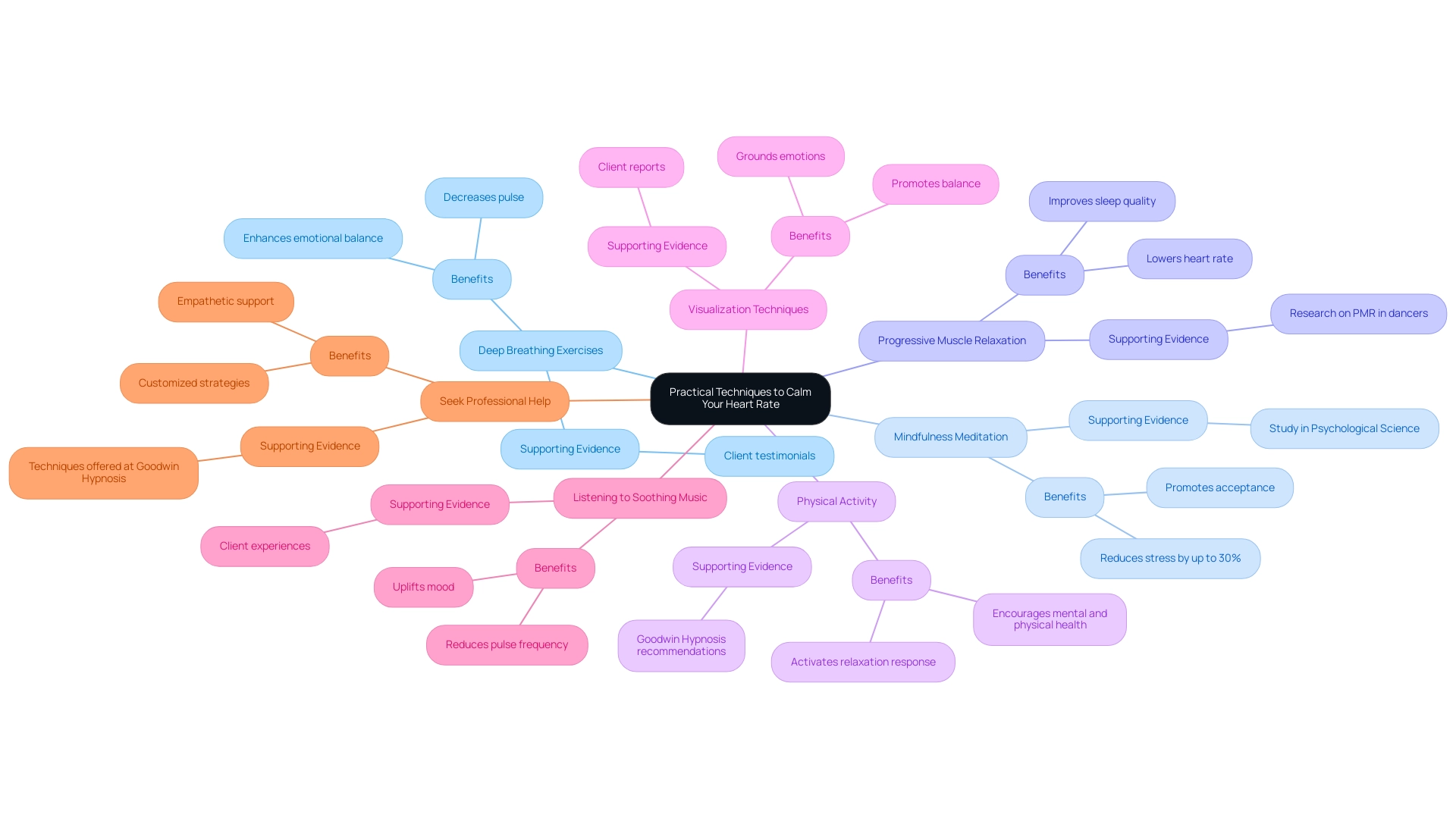
The Role of Nutrition in Managing Anxiety
The relationship between diet and mental well-being is profound, and understanding this connection can offer significant relief for those struggling with stress, especially given that such issues affect 40 million American adults. As highlighted in recent research published in the journal Brain Behavior and Immunity, nutrition plays a crucial role in managing stress.
Foods high in omega-3 fatty acids, like salmon, walnuts, and flaxseeds, have been demonstrated to effectively lessen symptoms of distress by supporting brain function and emotional well-being. Furthermore, incorporating an abundance of fruits, vegetables, and whole grains ensures you receive the essential vitamins and minerals necessary for optimal brain health. Staying hydrated is another essential factor; dehydration can increase heart rates and heighten feelings of distress, a common issue faced by many.
It may also be beneficial to limit caffeine and sugar, as these can worsen tension symptoms. By concentrating on a balanced diet that nourishes both the body and mind, you establish the foundation for mental stability and resilience. As noted by nutritionists, these dietary adjustments are not just about physical health—they represent a pathway to nurturing your mental well-being.
Many individuals who have tried traditional therapies often express dissatisfaction, finding talk therapy to be ineffective or burdensome, and are increasingly seeking alternative methods. Lisa S. Icenogle emphasizes, "If you find that stress is still getting to you even after trying these tips or are trying to treat it through alcohol or drugs, you need to ask for help."
Additionally, the Future Therapeutics Development case study showcases how researchers are exploring probiotic supplements that optimize levels of Lactobacillus and interferon gamma, potentially offering new avenues for managing stress. These insights illustrate the real-world applications of nutrition in addressing mental health challenges and reflect an evolving perspective on treatment options.
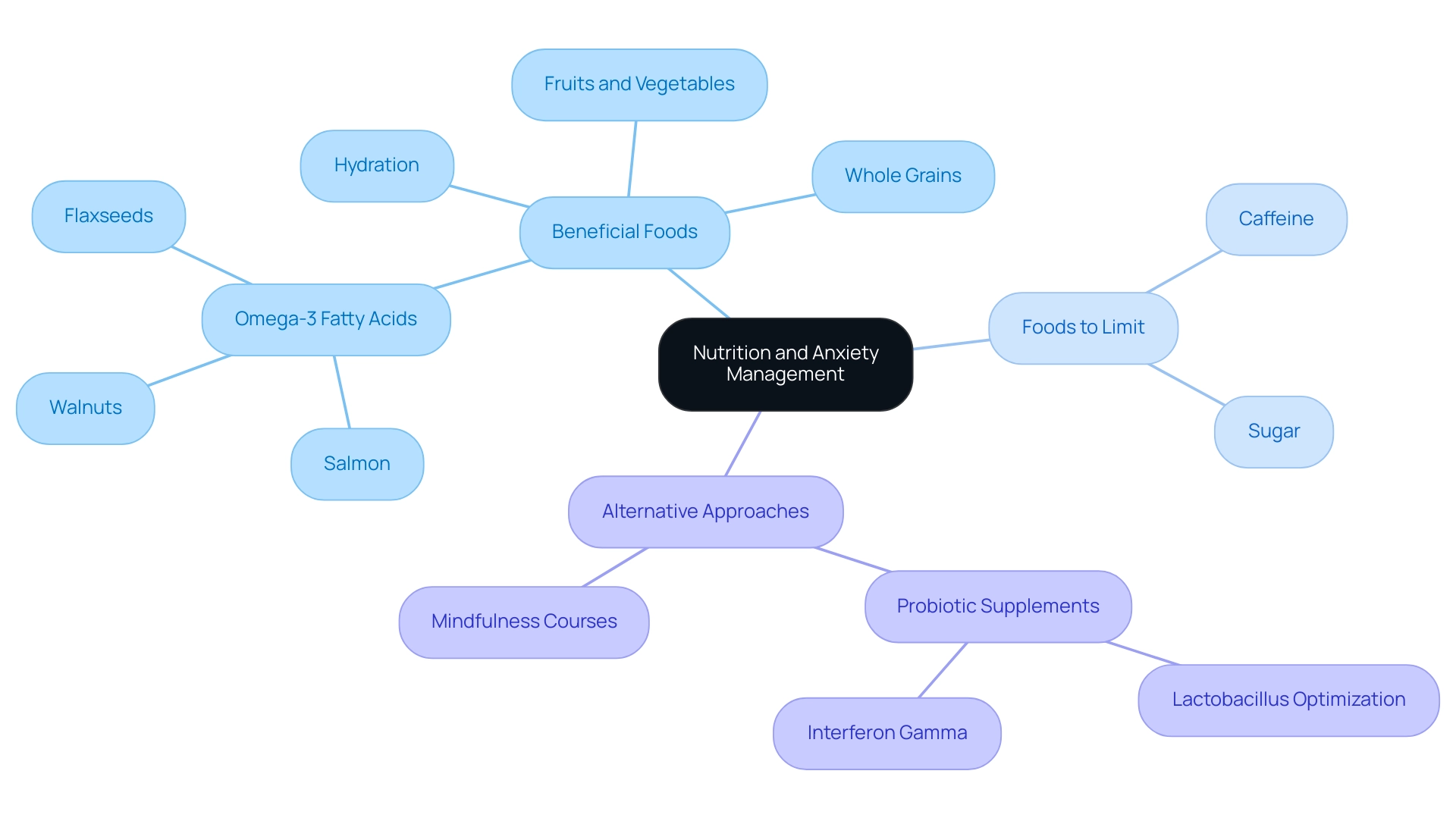
The Importance of Sleep in Anxiety Management
Quality rest is not merely a luxury; it's a foundation of mental well-being, particularly for those coping with stress and trauma. Studies indicate that daily feelings are linked to sleep, as insufficient rest can cause greater irritability and increased stress, often leading to a higher heart rate. Vandekerckhove et al. found that participants who focused on acknowledging and understanding their feelings without judgment took longer to fall asleep but experienced fewer awakenings, longer total sleep time, and higher sleep efficiency. This emphasizes how our mood is intricately connected to how well we rest.
To cultivate better sleep quality, consider:
- Establishing a consistent sleep schedule
- Creating a soothing bedtime routine
- Limiting screen time before bed to allow your mind to unwind
- Incorporating relaxation techniques such as deep breathing or gentle yoga to prepare your body for a restorative night's sleep
Furthermore, hypnosis and NLP can be transformative, helping to alleviate stress that disrupts sleep patterns. Many clients at Goodwin Hypnosis have reported significant improvements in their sleep quality and mental resilience after engaging in these holistic treatments. For instance, one client shared, 'After years of suffering from IBS, panic attacks, and self-esteem issues, I made an appointment at Goodwin Hypnosis. After a few hypnosis sessions, I felt peaceful, happier, and the panic attacks are now substituted by reasoning and a calm.'
Additionally, Cognitive Behavioral Therapy (CBT) has been recognized as an effective treatment for insomnia, helping individuals establish healthy sleep patterns and address negative thoughts about sleep. This approach exemplifies how prioritizing sleep hygiene fosters a sense of balance and equips you to handle stress more effectively throughout the day.
Remember, nurturing your sleep is an essential step toward mental health and well-being, and exploring effective alternatives like hypnosis can further support your journey.
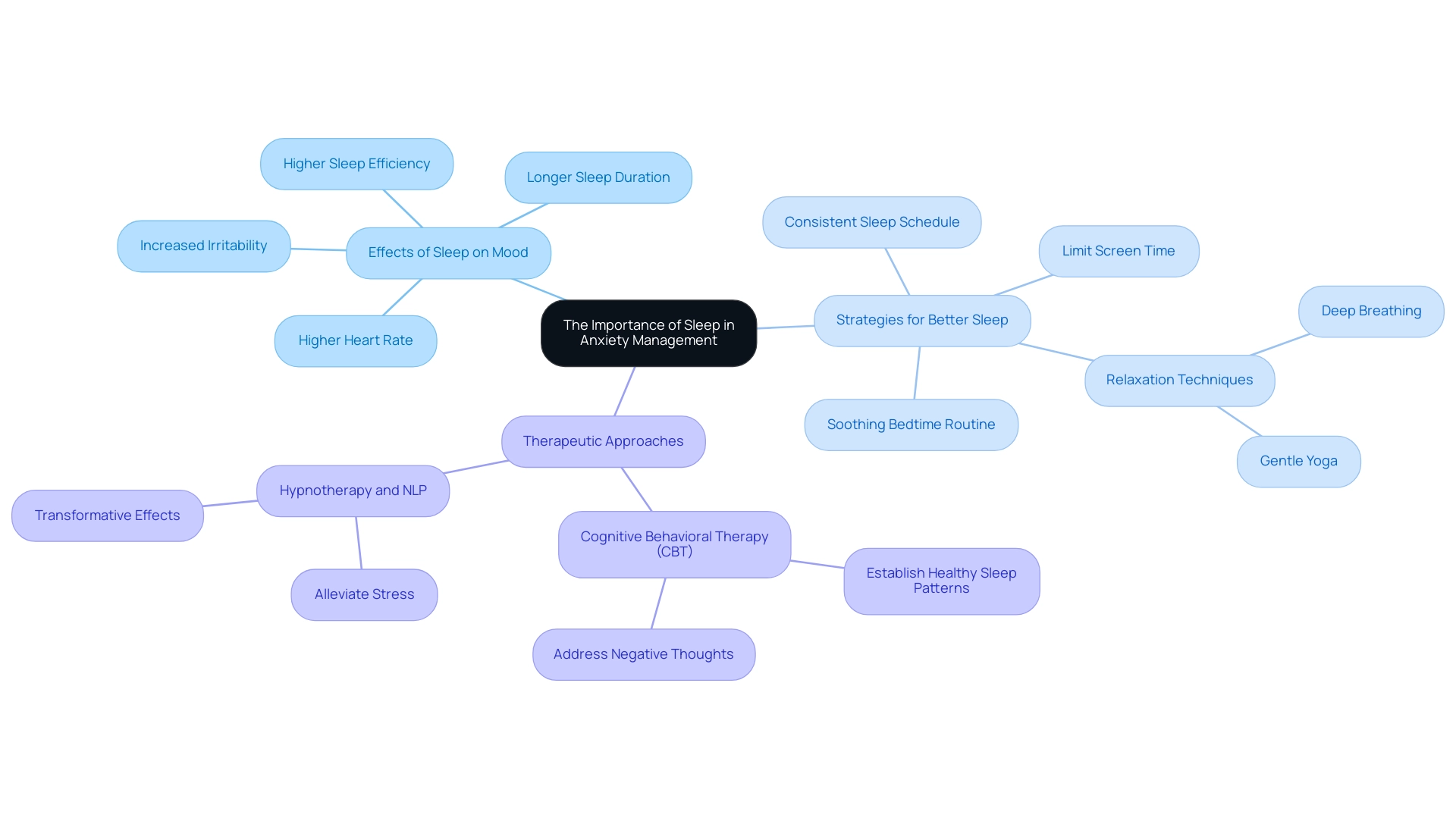
Utilizing Grounding Techniques During Anxious Moments
Grounding techniques act as a gentle anchor, aiding you in reconnecting with the present moment and alleviating feelings of unease, ultimately assisting in slowing your heart rate. A particularly effective method is the 5-4-3-2-1 technique, which invites you to engage your senses:
- Identify 5 things you can see
- Identify 4 things you can touch
- Identify 3 things you can hear
- Identify 2 things you can smell
- Identify 1 thing you can taste
Research shows that grounding techniques such as the 5-4-3-2-1 method can decrease stress levels by as much as 50% in certain individuals, making it a powerful tool for emotional regulation. This practice not only diverts your attention from anxious thoughts but also cultivates a heightened awareness of your surroundings. Additionally, holding onto a comforting object like a stress ball or a soft blanket provides a soothing tactile sensation that can further reduce stress.
According to Dr. Sarah Thompson, a clinical psychologist, "Grounding techniques are essential for individuals facing challenges, as they help create a sense of safety and presence." By integrating these grounding techniques into your daily routine, you enable yourself to handle stress more effectively, fostering a sense of calm and control amidst life's challenges.
Testimonials from clients at Goodwin Hypnosis underscore these benefits: for instance, Sharon McKneely shared how her sessions with Gina helped her set boundaries and reflect on her feelings, leading to improved mental health. Likewise, Gabriela Stanard observed notable progress in only five sessions, stating, "I can say that I have made more advancements regarding my stress in that short time than I had over the past 6 months."
Embracing grounding techniques can be a wonderful step towards nurturing your well-being, as evidenced by the positive transformations experienced by many clients at Goodwin Hypnosis. Additionally, recognizing that worry is common among many individuals, often arising from various causes such as trauma or stress, can further motivate you to seek effective coping strategies.
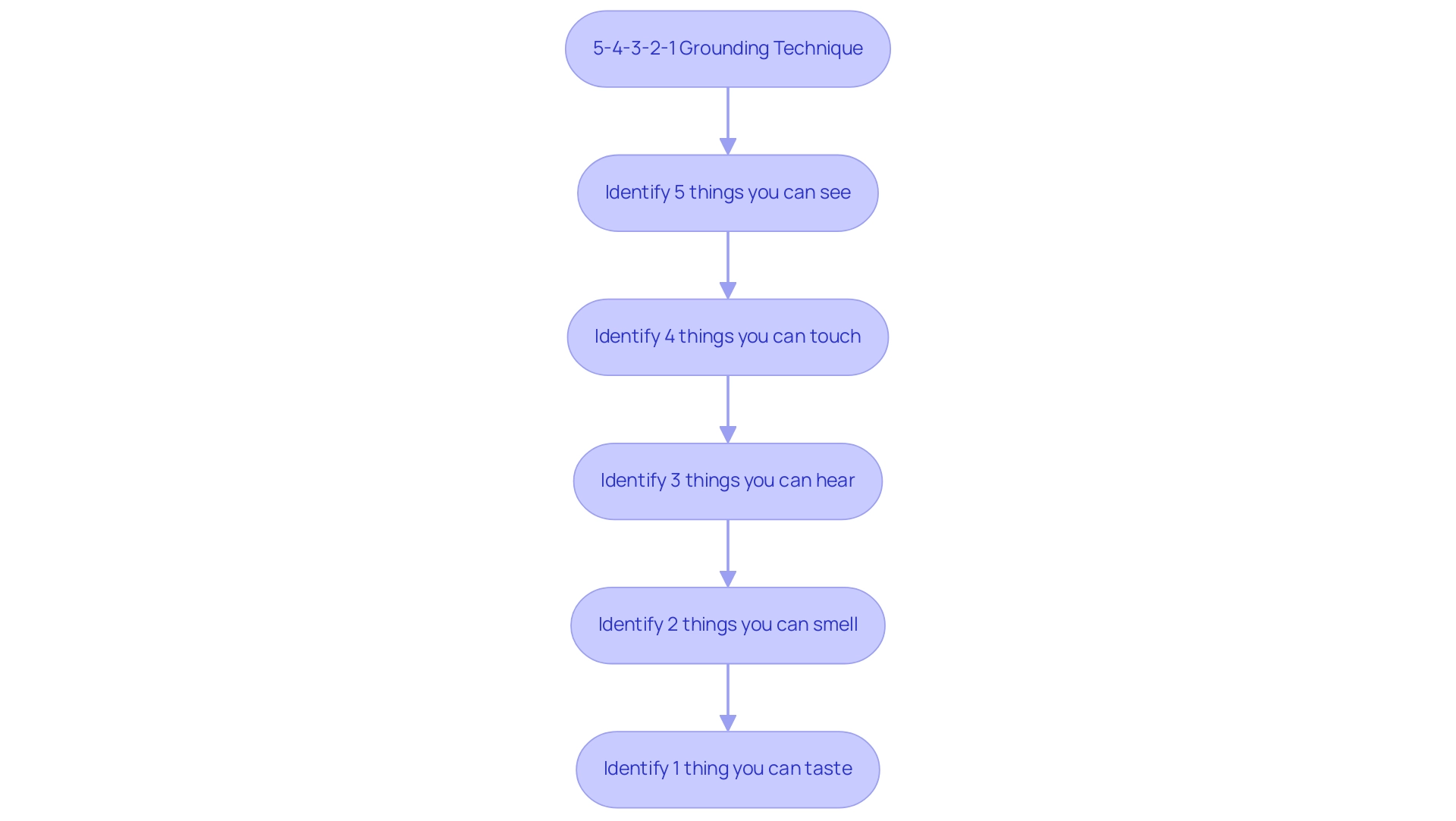
Building a Support Network
Cultivating a robust support network can profoundly empower your journey in managing stress, as evidenced by the experiences shared by clients of Todd Goodwin and Gina Goodwin, who are among the 2% of hypnotists who are board certified. Engaging with friends, family, or dedicated support groups creates a nurturing environment where you can openly share your experiences and emotions. This openness not only aids in normalizing your emotions but also reduces the feeling of isolation that often accompanies distress.
As Sharon McKneely expressed, 'I tried talk therapy for quite a bit of time and realized that I was going in circles, just talking about my problems and not fixing them.' It wasn't until she collaborated with Gina that she discovered a transformative method that addressed her personal needs at a deeper level.
According to Dr. Jane Smith, a clinical psychologist, 'Having a strong support network is essential for mental health; it allows individuals to feel understood and less alone in their struggles.' Recent studies underscore that social connections are crucial for mental health, revealing that participants who engaged in supportive environments reported lower levels of loneliness and heightened feelings of belonging.
For instance, a study by Kothgassner et al. (2018) found that individuals with strong social ties experienced significantly lower anxiety levels compared to those who were more isolated. Furthermore, reaching out to a experienced professional, like the hypnotists at Goodwin Hypnosis, can provide tailored guidance and coping strategies essential for navigating your unique challenges.
Remember, seeking assistance is not a weakness but a courageous step towards mental stability. The presence of a strong support system, combined with the transformative effects of hypnotherapy, can profoundly impact your well-being, offering comfort and reassurance as you work towards achieving a more balanced emotional state.
Case studies have demonstrated that group therapy environments, where individuals exchange their experiences and assist each other, can result in significant reductions in symptoms of distress, emphasizing the importance of social connections in managing such conditions.
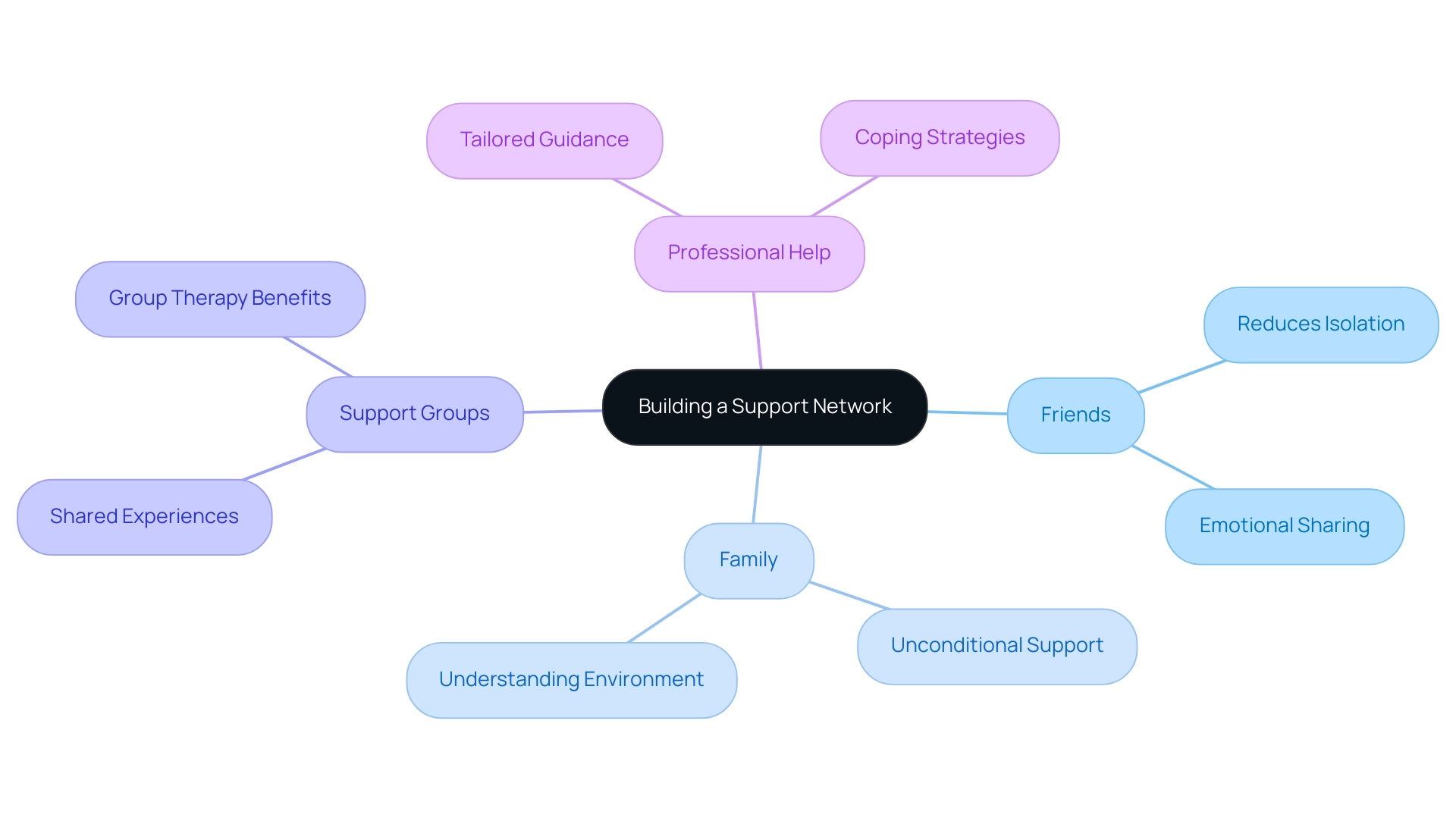
Incorporating Mindfulness into Daily Life
Incorporating mindfulness into your everyday activities can be an effective method to handle stress and regulate your heart rate. Begin by setting aside just a few minutes each day for mindfulness meditation, where you can focus on your breath and observe your thoughts without judgment. This practice allows you to cultivate a deeper awareness of your inner state. A study involving three groups of about 80 students revealed that regular mindfulness practices significantly enhance emotional well-being, with participants reporting a noticeable decrease in stress levels.
Throughout the day, you can bring mindfulness into simple activities—whether you’re eating, walking, or even washing dishes—by tuning into the sensations, smells, and sounds around you. This increased awareness helps anchor you in the present moment, effectively lowering tension and fostering a sense of calm.
Additionally, many have discovered that techniques such as hypnosis and NLP can also offer transformative relief from stress. Clients who have participated in these practices frequently share testimonials of significant transformation, reporting not only a decrease in stress but also a renewed sense of control over their personal lives. For example, one client stated, "After years of suffering from IBS, panic attacks, and self-esteem issues, I made an appointment at Goodwin Hypnosis. After a few hypnosis sessions, I felt peaceful and happier, and the panic attacks are now substituted by reasoning and calm."
Furthermore, it’s important to recognize that anxiety can stem from various causes, including low self-esteem, traumatic events, and chaotic upbringings. While traditional medications often focus on alleviating symptoms, they may not address these underlying issues and can lead to dependency or unwanted side effects. As you incorporate mindfulness and consider alternative approaches like hypnosis into your daily life, you’ll likely notice improvements in your emotional resilience and a more balanced heart rate, paving the way for a more peaceful existence.
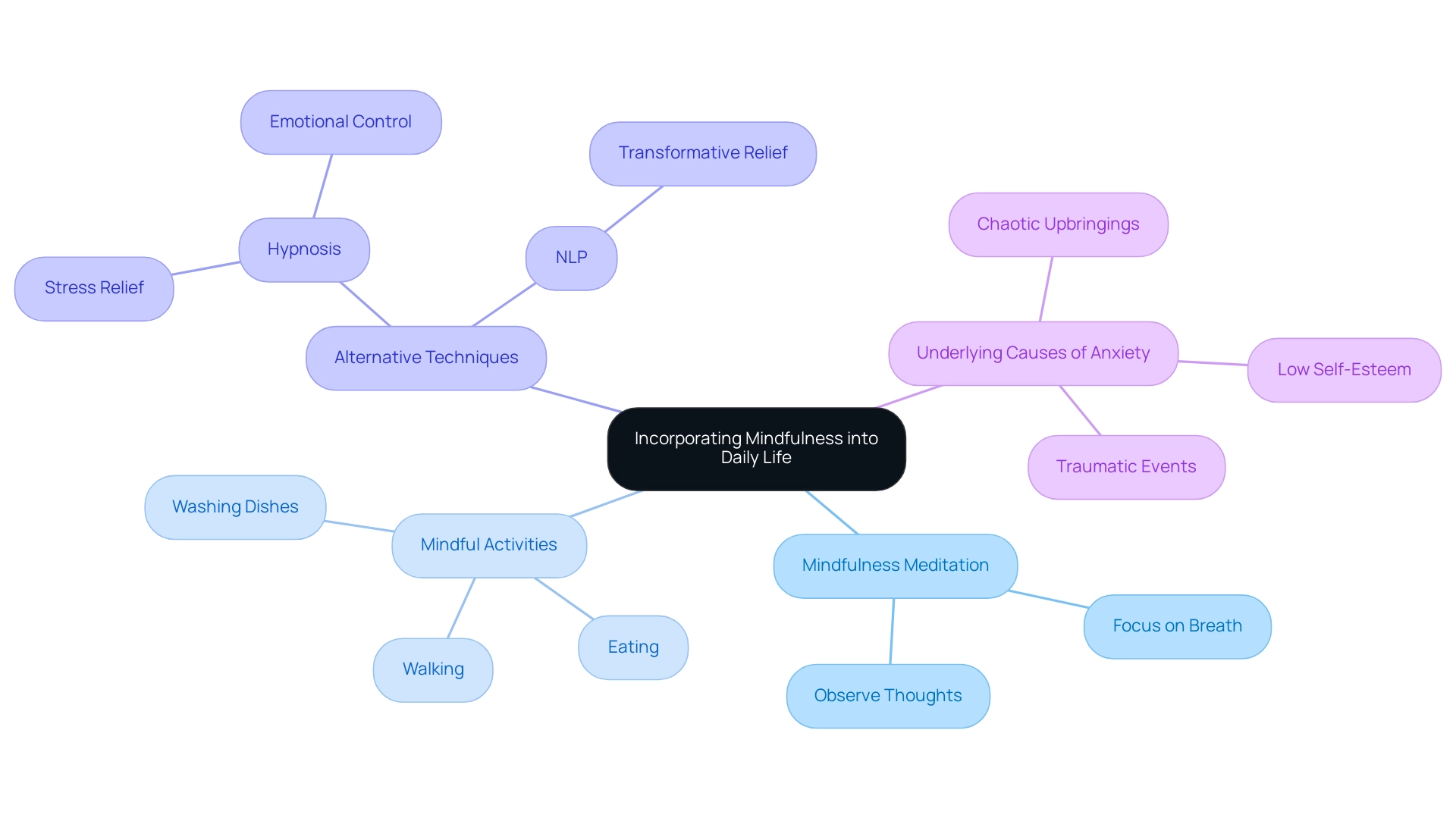
Conclusion
Understanding the intricate relationship between anxiety and heart rate is essential for navigating the challenges that anxiety presents in daily life. The article highlights how anxiety can lead to elevated heart rates, creating a cycle of panic and distress. However, there is hope in the form of practical strategies that can help individuals regain control.
Techniques such as deep breathing, mindfulness meditation, and progressive muscle relaxation provide effective ways to calm both mind and body, fostering emotional well-being.
Additionally, the importance of nutrition and sleep cannot be overstated when it comes to managing anxiety. A balanced diet rich in essential nutrients and adequate sleep are foundational to maintaining emotional stability. The insights shared from personal experiences and expert advice underline the significance of holistic approaches, including the incorporation of grounding techniques and the building of a supportive network.
These elements collectively empower individuals to confront their anxiety with resilience.
Ultimately, recognizing that anxiety is a shared human experience can serve as a source of comfort. By embracing these coping strategies and seeking professional support when necessary, individuals can embark on a transformative journey toward healing. The path may not always be easy, but with the right tools and a commitment to self-care, a more balanced and peaceful life is within reach.




